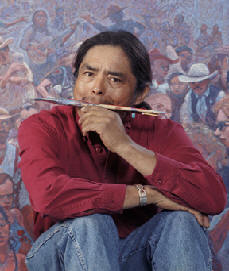With the storm behind us and another birthday behind me, I feel the tinge of spring in the air. Soon the ice-sculpted curbs and alleyways of our town will be but a memory. Ahead is the lush carpet of wildflowers of spring, where a field of campaign signs are blooming. It’s late winter, a city council and mayoral campaign is under way, and a fresh crop of promises adorns yards and bumpers.
I’ve had a brush with politics myself. In the early 1990s I was approached by my community of Shonto to run for council delegate, a chapter representative to the Diné nation’s capital in Window Rock. While I knew that being a politician, walking two worlds, was a powerful and messy job, my youth and innocence made me consider running. The two opposing candidates pulled out of the race when they heard I was a possible candidate. There was a meeting one night in my uncle’s hogan. Strong brown faces lined the octagonal walls. In the light of the kerosene lamp, relatives and strangers voiced their support. There was talk of community projects. There were grazing and land issues that needed attention and home-site leases that needed resolution. The whole thing felt like an overwhelming undertaking. But even more daunting were the comments I heard from other politicians and would-be politicians. One potential candidate expressed his excitement about campaigning, telling me how his supporters tore down his opponent’s signs and used the wood to build sheep corrals. A sitting councilman laughed as he told me, “You should join us. We have so much fun in Window Rock. There is much to make fun of; we laugh a lot in the chamber.” And I thought, “It’s no wonder nothing gets done.” I made no commitment that night.
It was my mother who gave me the wisest advice. “You are an artist, a creative healer, a visual person,” she told me. “Politics is not for you. You do not possess the spirit of Coyote. Your spirit is in Spider Woman. Politics will make you a larger target for evil thoughts.” I took her advice seriously and declined the offer that night. The two candidates re-entered the race, and a pastor from the neighboring chapter won the council delegate position. He did not survive the temptations that the office brought, and instead became a glaring example of how politics turns even a good man against himself.
Candidates are mostly well intentioned, with the good of the community at heart. But politics is still a risky undertaking. It’s a challenge to negotiate all the agendas, while remaining true to oneself and to k,e’, a fundamental Navajo law. K,e’ is a Diné philosophy about knowing your place among your own people. At a local level, the chapter, campaigns should be waged with k,e’ in mind. A candidate must always remember where he stands within the community and within the family. K,e’ is the ability to know where you are. Way back, before council meetings were held in shiny places like Las Vegas, I’d meet a councilman on the sheep trail, tending his flock. Councilmen were accessible then. They wore their role well and made us proud. You knew them as elders, as k,e’.
Mutton stew also plays a part in political campaigns. Often times during elections, both candidates will erect their mutton stands. Facing one another across the chapter yard, they entice our vote through mutton stew and fry bread, free of charge except for political diatribes. I have found myself crossing the reservation on election day, and have relished the opportunity for good mutton stew and optimistic outlooks from potential leaders. But candidates seldom win our vote through our bellies.
There are many council members who do good for the people. Sadly, there are many who are there for power security. The job doesn’t pay much, but it brings perks and power. I want to believe in the promises that the campaign signs in my neighborhood offer. I want to lend my support to the process. And I want the candidates to embrace that system of k,e’. We are one community. One affects all. I ask you to make those blooming signs matter.

